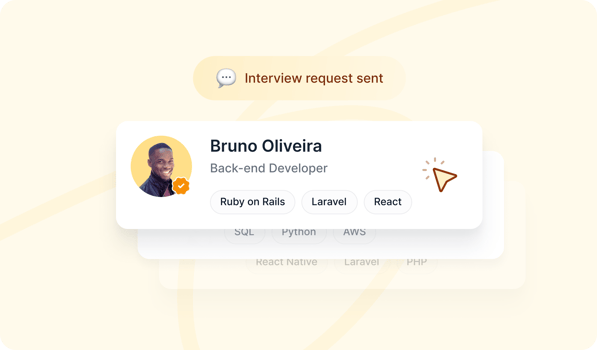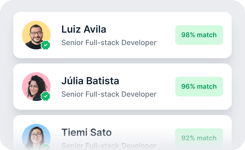Hire Remote Cryptocurrency Developers Effectively
As the popularity and adoption of cryptocurrencies continue to soar, there is a growing demand for skilled professionals who can develop blockchain solutions and innovative solutions within this domain. Hiring cryptocurrency developers has become crucial for companies aiming to capitalize on the immense potential offered by blockchain technology and digital currencies.
Blockchain developers are pivotal in shaping the future of digital currencies and blockchain technology. They deeply understand blockchain protocols, decentralized systems, cryptography, and smart contract development. These developers are responsible for designing, coding, and maintaining blockchain-based applications, platforms, and protocols that power various cryptocurrencies.
Finding and hiring competent cryptocurrency developers can be challenging due to needing more specialized talent. However, by understanding the unique skills and qualities required for success in cryptocurrency development, companies can effectively navigate the hiring process and secure top talent. This article aims to provide insights and guidance on how to hire full-stack cryptocurrency developers effectively.
What to Look for When Hiring Cryptocurrency Developers
Technical Skills
To hire blockchain developers, it is crucial to assess their technical skills. Cryptocurrency development requires proficiency in various areas, including blockchain technology, cryptography, smart contracts, and distributed ledger systems. An ideal candidate should have a solid understanding of popular blockchain technologies such as Ethereum or Bitcoin and be familiar with blockchain fundamentals.
Additionally, they should possess expertise in programming languages commonly used in blockchain projects, such as Solidity for Ethereum smart contracts or C++ for Bitcoin. Their knowledge of cryptographic algorithms and protocols is also vital for ensuring the security and integrity of cryptocurrency systems.
Communication Skills
Effective communication is essential for cryptocurrency developers, who often collaborate with cross-functional teams and must articulate complex technical concepts to non-technical stakeholders. Strong communication skills enable a cryptocurrency developer to understand project requirements, work collaboratively with designers and product managers, and provide regular updates on progress.
Cryptocurrency developers should be able to explain blockchain concepts, protocols, and potential challenges clearly and concisely. Furthermore, they should be adept at active listening, gathering requirements, and addressing client feedback to ensure customer satisfaction.
Blockchain scalability
One of the critical technical topics in the blockchain space is scalability. As cryptocurrencies gain widespread adoption, the demand for blockchain networks capable of handling many transactions increases. Hiring cryptocurrency developers with expertise in blockchain scalability solutions can be highly advantageous.
They should be knowledgeable about techniques such as sharding, layer-two protocols like the Lightning Network, or alternative consensus algorithms like proof-of-stake (PoS) to address the scalability limitations of traditional blockchain networks. A candidate's understanding of various scalability approaches and their ability to implement efficient and scalable solutions is crucial for long-term success in the cryptocurrency space.
Privacy and security in cryptocurrency systems
Privacy and security are other critical technical topics when hiring cryptocurrency developers. Cryptocurrency systems deal with sensitive financial information, and ensuring the confidentiality and integrity of transactions is paramount. A cryptocurrency blockchain developer should understand cryptographic protocols and techniques for protecting user data and transactions.
This includes knowledge of privacy-focused technologies like zero-knowledge proofs, ring signatures, and secure multi-party computation. Their ability to implement robust security measures and identify potential vulnerabilities in cryptocurrency systems is crucial for building trust and maintaining the platform's integrity.
Top 5 Cryptocurrency Developer Interview Questions
What is the consensus algorithm?
Asking about the consensus algorithm helps you gauge a candidate's understanding of how blockchain networks achieve agreement and validation of transactions. The candidate's answer should demonstrate familiarity with popular consensus algorithms like Proof-of-Work (PoW) and Proof-of-Stake (PoS) and their underlying principles. By assessing their knowledge of consensus algorithms, hiring managers can evaluate a candidate's grasp of the fundamental concepts that ensure the integrity and security of blockchain networks.
What does a coinbase transaction mean?
This question assesses a candidate's knowledge of the inner workings of cryptocurrency transactions. A Coinbase transaction is an initial transaction in a block that rewards the miner with newly minted cryptocurrency. Candidates should be able to explain the purpose and significance of the Coinbase transaction, its inclusion in a block, and how it contributes to the overall security and functioning of the blockchain. This question provides insight into a candidate's understanding of cryptocurrencies' transactional aspects and incentivization mechanisms.
How can you stop double spending?
Double spending is a critical challenge in decentralized digital currencies, and understanding how to mitigate it is crucial. By asking this question, you can evaluate a candidate's understanding of the mechanisms to prevent the same digital currency unit from being spent multiple times. The candidate should be able to discuss concepts like transaction validation, consensus mechanisms, and the role of blockchain confirmations in preventing double-spending. Their response will indicate their grasp of security measures in cryptocurrency systems.
What Is the difference between Proof-of-Stake (PoS) and Proof-of-Work (PoW)?
This question evaluates a candidate's knowledge of different consensus mechanisms and their advantages and disadvantages. Candidates should be able to explain the critical distinctions between PoS and PoW, including the underlying principles, energy efficiency, scalability implications, and the level of decentralization each mechanism offers. Their response will showcase their understanding of the consensus algorithms commonly used in cryptocurrencies and their ability to assess trade-offs in designing blockchain systems.







